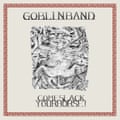Folk’s latest fresh-faced, vintage garb-wearing sensations formed around central London musical instrument shop Hobgoblin where several members worked (hence the band name), ran sessions in Matchstick Piehouse (the recently closed radical south London arts space known for jazz and cabaret nights) and are a sprawling queer collective, including members with fabulous names such as Rowan Gatherer and Sonny Brazil. So far, so hip.

But they’re loved by scene veterans too, including Martin Carthy (“they can play [and] sing and they’re fearless”, he told Tradfolk this year) while Paul McCartney, whose Soho Square HQ is around the corner from Hobgoblin, used to pop in to play harmonica with them. Their debut EP, an album-length, six-song showcase, mixes a twitchy, eager musicianship with rowdy flamboyance.
Black Nag, from John Playford’s 1651 collection of instrumental dances, kicks off proceedings, a minor-key stomp driven by fiddles and squeezeboxes which successfully builds a quivery mood of menace. The Prickle Holly Bush follows, a dirge about a man facing the gallows, who watches his family turn up one by one, not to save him by bringing gold, but to watch the coming show. A lover ultimately saves him, suggesting a narrative about chosen family that the band only noticed later, but now proudly own.
Theatrical vocals throughout risk drawing attention away from the powerful stories, however, even as they empower marginalised voices. When poor children are described pulling “the skin from the wool” from a stolen sheep in The Brisk Lad, a desperate Dorset ballad about poverty, Gatherer’s delivery threatens comedy. More affecting is the unison singing in Widecombe Fayre, and the stunning eleven-minute Birds In the Spring/May Morning Dew, a blissful reminder of the preciousness of our natural world. Marrying recorders and harmonies with lyrics about the injustice of lands occupied by aristocrats and colonial powers, it says something powerful, and says it well.
Also out this month
Angeline Morrison, Cohen Braithwaite-Kilcoyne and Jon Bickley’s stirring, imaginative Grace Will Lead Me Home (Invisible Folk) explores the 250th anniversary of the hymn Amazing Grace, and the relationship people of colour have with the song in folk, gospel and other genres (notably, its writer, John Newton, became a prominent abolitionist after years trading enslaved people). Awen Ensemble’s Cadair Idris (New Soil) is an album of ambient folk treasures, exploring the seven-strong band’s Celtic roots in songs inspired by mountain legends in north Wales. A meld of Fender Rhodes pianos, saxophones and bodhráns create visions of a 21st-century Pentangle. Kansas bluegrass artist Abbey Masonbrink’s debut, Rising (self-released) is also an exciting, adventurous listen, mixing her traditional techniques into a successful mode of baroque art-pop. Her arresting vocals should also win fans of artists from Cinder Well to Angel Olsen.
Source: theguardian.com

















